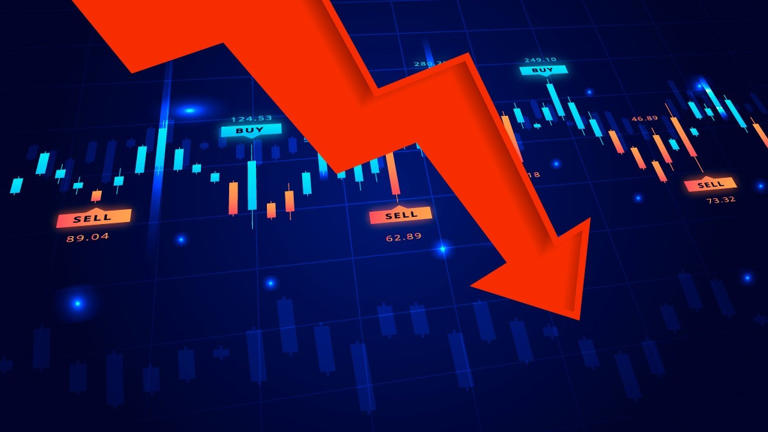On Wednesday, pharmaceutical stocks witnessed a sharp decline, with the Nifty Pharma Index falling over 2% amid growing concerns about potential trade barriers. The selloff was led by Aurobindo Pharma, which experienced a steep drop of up to 9.5%, reaching an intraday low of ₹1,053.45. This made it the worst-performing stock in the pharmaceutical sector for the day.
The decline came after former U.S. President Donald Trump signaled his intention to impose a 25% tariff on imported pharmaceutical products if re-elected. His statement raised alarms about rising costs and potential disruptions in the global drug supply chain, particularly affecting Indian pharmaceutical companies. India is one of the largest suppliers of generic medicines to the U.S. market, and any increase in tariffs could impact their profitability and competitiveness.
Investors reacted swiftly to the news, leading to a broad-based selloff in pharma stocks. Market participants are closely monitoring further developments, as the proposed tariff policy could have significant implications for Indian drug manufacturers, many of whom rely heavily on exports to the U.S.
Indian pharmaceutical stocks faced heavy selling pressure on Wednesday following former U.S. President Donald Trump’s announcement of potential tariffs on imported drugs. Dr. Reddy’s Laboratories saw a sharp decline of 5.8%, bringing its stock price down to ₹1,128.90. Zydus Lifesciences also took a significant hit, falling 4.8%.
Sun Pharmaceutical Industries, the country’s largest pharmaceutical company, was not spared from the downturn. Its stock dropped 3.2% to ₹1,647.35, making it the biggest loser on the BSE Sensex and one of the top five decliners on the Nifty 50 index. Several other major pharmaceutical firms also recorded losses, with Lupin sliding 4%, Glenmark Pharmaceuticals declining 2.7%, and Cipla shedding 2.2% during the session.
The broader market reaction was fueled by Trump’s latest trade policy stance, in which he signaled his intent to impose tariffs not only on pharmaceuticals but also on automobiles and semiconductor chips. His proposal aims to encourage companies to establish manufacturing operations in the United States rather than relying on imports. While no specific timeline for the tariff implementation was mentioned, Trump suggested that the initial levy would be set at 25% and could gradually increase over time.
The announcement added to existing global trade uncertainties, sparking concerns among investors about the potential impact on Indian pharmaceutical companies, many of which are key suppliers of generic medicines to the U.S. market. Market participants are closely watching for further developments, as the proposed policy could reshape trade dynamics and affect the cost structure of the industry.
Indian pharmaceutical companies, which supply nearly 40% of the generic medicines consumed in the United States, are facing increasing challenges amid evolving trade and regulatory pressures. The sector has already been grappling with pricing constraints and stringent regulatory oversight from the U.S. Food and Drug Administration (FDA), factors that have weighed on profitability and growth.
The recent proposal to impose a 25% tariff on imported pharmaceutical products further escalates the risks for Indian drug manufacturers. If implemented, these tariffs could significantly impact their profit margins, making exports to the U.S. more expensive and potentially less competitive compared to domestic manufacturers or suppliers from other regions. Given that the U.S. is the world’s largest pharmaceutical market and a crucial revenue driver for many Indian drug firms, any disruption in trade dynamics could have far-reaching implications.
With increased costs and potential market shifts, companies may need to reassess their pricing strategies, supply chain logistics, and long-term expansion plans. The industry is closely monitoring further policy developments to gauge the full extent of the impact on global pharmaceutical trade.
The latest tariff proposal is part of a broader series of trade measures introduced by former U.S. President Donald Trump as he seeks to reshape the country’s economic policies. Since assuming office last month, Trump has already taken decisive steps to impose new tariffs on Chinese imports, signaling a more protectionist stance aimed at reducing reliance on foreign goods. Additionally, he has announced fresh duties on steel and aluminum products, reinforcing his commitment to boosting domestic manufacturing and minimizing trade deficits.
With the pharmaceutical sector now in focus, investors and industry stakeholders are closely monitoring the situation for further details from the U.S. administration. The prospect of a 25% tariff on imported drugs has raised concerns about potential cost increases and market disruptions, particularly for Indian pharmaceutical companies, which are among the largest suppliers of generic medicines to the U.S.
In the coming days, attention will also be on how Indian trade officials respond to the proposed measures. Any diplomatic negotiations, policy adjustments, or countermeasures could play a crucial role in shaping the future trade relationship between the two countries. Market participants are expected to remain vigilant as they await more clarity on the potential impact of these developments.

